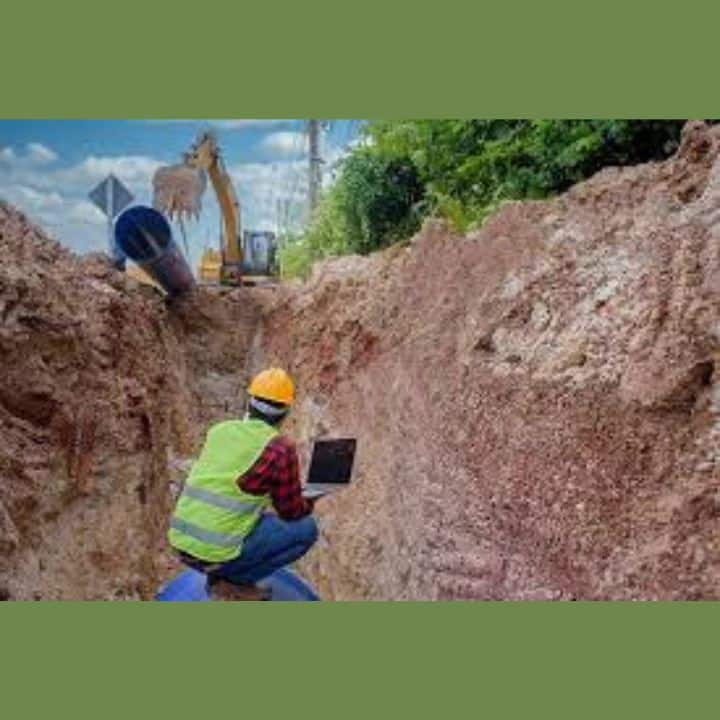Geotechnical engineering is a crucial field within civil engineering, focusing on the study of soil, rock, and underground water systems and their influence on the built environment. The role of a geotechnical engineer is to ensure that structures built on or in the ground are safe, stable, and sustainable. This article will provide an in-depth look at the key concepts, applications, and importance of geotechnical engineering, its impact on civil construction, and why it is essential for the planning and design of infrastructure.
What is Geotechnical Engineering?
Geotechnical engineering is the branch of civil engineering that deals with the behavior of earth materials in the context of engineering. It involves the study of soils, rocks, groundwater, and the interaction between these materials and civil structures like buildings, bridges, roads, and tunnels. The primary aim of geotechnical engineering is to understand how the ground will behave under different loading conditions and to design foundations and earthworks accordingly.
In geotechnical engineering, engineers apply principles of soil mechanics, rock mechanics, and hydrology to evaluate subsurface conditions and provide solutions for problems that may arise from the interaction between structures and the ground. This includes determining the strength, stability, and deformation characteristics of soils and rocks, as well as understanding groundwater conditions that may affect the performance of foundations and other structures.
The Role of a Geotechnical Engineer
A geotechnical engineer plays a key role in the initial stages of a construction project. Their primary responsibility is to conduct site investigations to determine the physical properties of the soil and rock on a site before construction begins. These investigations include drilling boreholes, collecting soil samples, conducting laboratory tests, and analyzing geophysical data.
Once the soil properties have been determined, the geotechnical engineer uses this information to design the foundation system for the structure. This could be a shallow foundation (such as a slab or spread footing) or a deep foundation (such as piles or caissons), depending on the soil conditions and the load requirements of the structure.
Geotechnical engineers also assess the risks of natural hazards such as landslides, earthquakes, and soil liquefaction, which could affect the stability of the structure. By understanding the ground conditions, they help to mitigate potential risks that could compromise the safety of the structure.
Importance of Geotechnical Engineering in Civil Construction
Geotechnical engineering is indispensable in civil construction, as it ensures that projects are built on stable ground. Without proper geotechnical investigations and considerations, a construction project may face severe consequences, including foundation failure, excessive settlement, or even catastrophic collapses.
Here are some reasons why geotechnical engineering is important:
- Foundation Design
The primary application of geotechnical engineering is foundation design. A solid foundation ensures that structures remain stable over time. Geotechnical engineers assess soil conditions to determine the most suitable foundation system. - Soil Stability
Understanding soil properties is essential for determining how much load the ground can bear. Weak or unstable soils could cause settling or tilting, which can jeopardize the structural integrity of a building. - Environmental Concerns
Geotechnical engineering also addresses environmental issues, such as groundwater contamination or landslides. It helps in designing structures that minimize environmental impact while maintaining safety and functionality. - Risk Mitigation
Geotechnical engineers assess risks like soil erosion, liquefaction, or expansive soils that can lead to problems in construction. Identifying these risks early allows for the adoption of mitigation strategies, ensuring that construction projects proceed smoothly. - Sustainability
Proper geotechnical analysis helps in choosing the right materials and foundation types that minimize the environmental impact of construction. By using geotechnical methods, engineers can design foundations that are energy-efficient and long-lasting.
Key Components of Geotechnical Engineering
There are several critical components involved in geotechnical engineering that shape the success of any construction project:
1. Soil Mechanics
Soil mechanics is a sub-discipline of geotechnical engineering that focuses on understanding the properties of soil and its response to applied forces. This includes soil shear strength, compressibility, and permeability. Geotechnical engineers use soil mechanics principles to predict how the soil will behave under loading conditions, such as the weight of a building or bridge.
2. Rock Mechanics
Rock mechanics is another sub-discipline that deals with the behavior of rock masses. It is especially important in the design of tunnels, dams, and foundations for high-rise buildings. Geotechnical engineers study rock properties, such as its strength, deformability, and fracture patterns, to determine its suitability for supporting structures.
3. Hydrology
Hydrology is concerned with groundwater flow and its impact on construction projects. Groundwater can affect the stability of foundations and cause erosion or flooding if not properly managed. Geotechnical engineers assess groundwater levels and soil permeability to prevent these issues.
4. Geophysical Methods
Geophysical techniques are used to analyze subsurface conditions without the need for drilling. These methods help in mapping the depth of soil layers, identifying bedrock, and detecting any underground anomalies such as voids or water pockets.
5. Site Investigations
Site investigations are a fundamental aspect of geotechnical engineering. Through a series of boreholes, soil sampling, and in-situ testing, geotechnical engineers gather data on the subsurface conditions. This data is crucial for determining the appropriate foundation design, ensuring the structural safety of the project.

Read more: Mr. Beast Casino App
Applications of Geotechnical Engineering
Geotechnical engineering is applied in various sectors of construction and infrastructure development. Some key applications include:
Q. Foundation Engineering
The design of shallow and deep foundations to support buildings, bridges, and other structures.
Q. Slope Stability Analysis
Ensuring the stability of slopes, embankments, and earthworks to prevent landslides.
Q. Retaining Structures
Designing retaining walls and other structures to hold back soil and prevent erosion.
Q. Tunnel Design
Geotechnical engineers assess soil and rock conditions when designing tunnels for transportation or utilities.
Q. Dams and Reservoirs
Ensuring the stability of dams and reservoirs by studying the geology and soil conditions at the site.
Q. Road and Pavement Design: Geotechnical engineers evaluate subgrade soil and aggregate materials to design durable and stable roads.
Challenges in Geotechnical Engineering
Despite its importance, geotechnical engineering is not without its challenges. Some common issues that geotechnical engineers encounter include:
Q. Unpredictable Ground Conditions: Subsurface conditions can vary significantly across a site, making it challenging to predict soil behavior accurately.
Q. Soil Liquefaction: In earthquake-prone areas, certain soils can lose their strength during seismic events, leading to foundation failure.
Q. Expansive Soils: These soils swell when wet and shrink when dry, which can cause damage to foundations and structures.
Final Thoughts
Geotechnical engineering is an essential discipline in civil construction that ensures the safety, stability, and sustainability of infrastructure projects. By understanding soil, rock, and groundwater conditions, geotechnical engineers design foundations and structures that are resilient to natural forces and environmental challenges. Whether it’s designing the foundation for a skyscraper, ensuring the stability of a bridge, or managing the risks of landslides, geotechnical engineering plays a critical role in shaping the world we live in.






